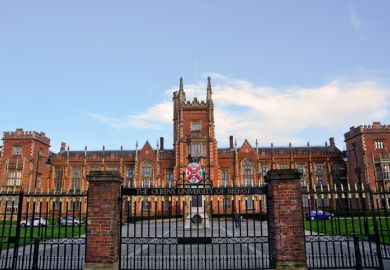Source: Alamy
Helping hand: one in seven cheat
One in seven Russian students readily admits to cheating in university exams, a national poll of undergraduates has revealed.
One in 25 students also reports having paid for someone else to write at least one mid-term or final-year paper, according to the annual Monitoring of Education Markets and Organizations Project (Memo), which received responses from almost 3,000 Russian undergraduates in 2013.
The project confirms the widespread belief that “cheating is blossoming” in Russian universities, according to Igor Chirikov, senior research fellow at the Institute of Education at the Higher School of Economics in Moscow (HSE), which conducted the poll.
Even those who did not admit to cheating had a high tolerance for academic dishonesty, with half of students in economics and management, questioned for a separate survey, stating that cheats should receive no more than a caution if caught, says Dr Chirikov, who also works at the Center for Studies in Higher Education at the University of California, Berkeley.
“These expectations correspond to the actual behaviour of faculty members,” he writes in a journal article detailing the findings. According to a parallel Memo survey of academics, “the majority of them usually just give cheaters a warning or lower the grade”, Dr Chirikov says.
With few Russian universities tackling plagiarism and other forms of academic dishonesty at an institutional level, “cheating is blossoming both among students and faculty and reinforcing corruption practices outside academia”, he adds.
While acknowledging that the wider acceptance of corruption in Russian society contributed to the phenomenon, Dr Chirikov also speculated that “cheating has become a response to boring and meaningless education”.
“Students cheat when they are cheated,” says Dr Chirikov, whose claims are published in a paper titled “The mystery of Russian students: poor learning experience, high satisfaction” in the spring edition of the HSE journal Higher Education in Russia and Beyond.
The paper says data from a 2013 poll of more than 4,000 economics and management undergraduates at 11 leading Russian universities reported that 70 per cent of students spent most of their time in class writing down what a lecturer says.
Students in Russia are “rarely challenged intellectually” and “do not engage much in creative and intellectually challenging activities”, Dr Chirikov says.
Only 17 per cent of students said that they regularly received comments on their work from staff, yet more than 80 per cent were satisfied with their learning environment, the economics and management poll also found.
“Students demonstrate a high level of satisfaction with their learning experience and do not worry about the quality,” says Dr Chirikov, who believes that it is naive to expect students to become “change agents” as they have “hardly put any pressure on universities to revise their curricula and teaching methods”.
Register to continue
Why register?
- Registration is free and only takes a moment
- Once registered, you can read 3 articles a month
- Sign up for our newsletter
Subscribe
Or subscribe for unlimited access to:
- Unlimited access to news, views, insights & reviews
- Digital editions
- Digital access to THE’s university and college rankings analysis
Already registered or a current subscriber?





